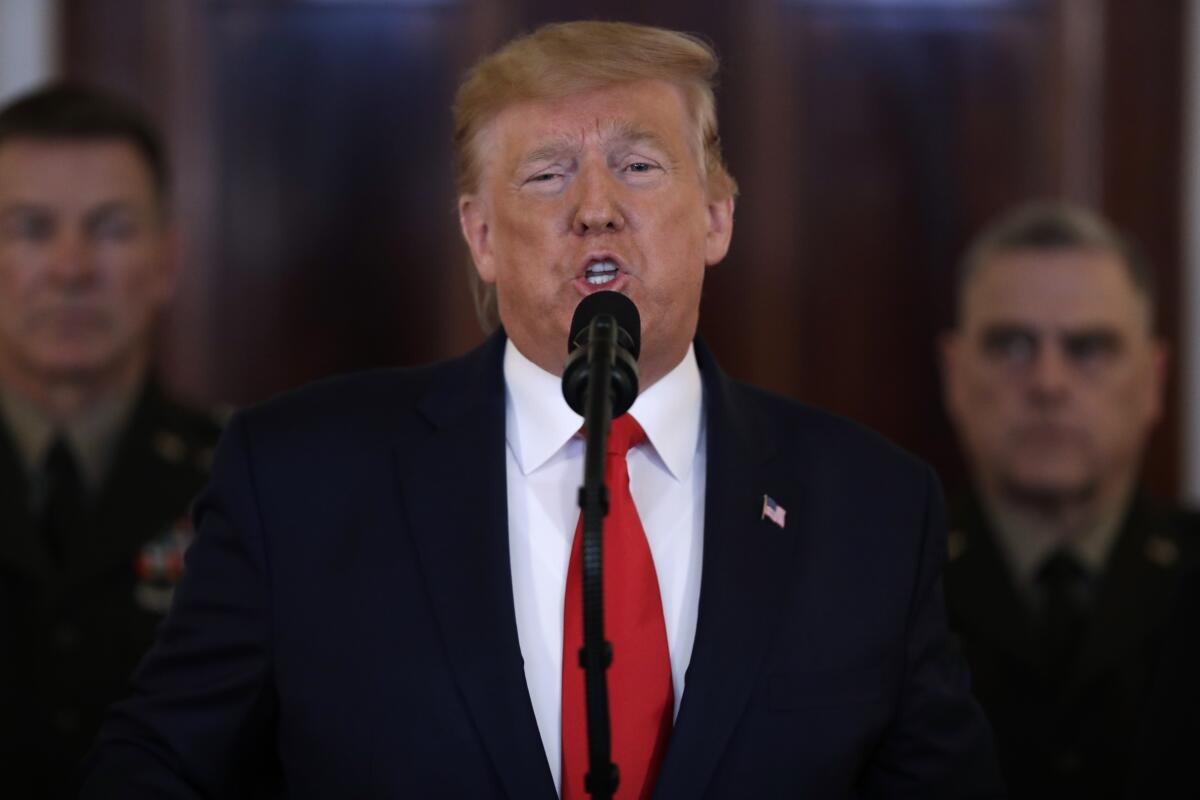Editorial: Trump and Iran step back from the brink — for now

- Share via
President Trump sought to assure the world late Tuesday that Iran’s flurry of rocket attacks on two Iraqi military bases housing U.S. forces were of no significant consequence. “All is well!” he tweeted. “So far, so good!” He followed that up with a televised address Wednesday morning in which he noted that no Americans had been harmed in the attacks, that the Iranian government “appears to be standing down,” and that the U.S. intends to impose more economic sanctions — apparently signaling an end to offensive military action.
The nation can only hope that this will be the end of it. Perhaps Trump and the Iranian government have flexed their muscles to their own satisfaction, displayed to their people that they will not stand for the aggression of the other, and halted the escalation of hostilities before they triggered all-out war. If so, that would be very good news, although defense analysts warn that cyber attacks are likely, as well as actions by militias in Iraq sympathetic to Iran.
This episode should make the nation very nervous. Yes, the U.S. has a right to defend itself against those who would do it harm, but it also must temper its responses with a mature and sober calculation of the consequences. Trump does not appear to have done so, reflexively choosing the assassination of a top official in a sovereign government (who was a violent and destabilizing influence in the Mideast) over less risky options, and then crowing about it.
How did the U.S. and Iran get to this point? It’s been a long path. The CIA aided the 1953 coup d’etat that overthrew Iran’s democratically elected prime minister, Muhammad Mossadegh, which elevated the Pahlavi family to power and set the stage for the 1979 Islamic revolution that has framed U.S.-Iran relations ever since.
The latest round of tensions began in May 2018, when Trump withdrew from the Iran nuclear deal and reinstated economic sanctions. Relations deteriorated quickly, with the U.S. sending additional military forces to the Gulf as Iran and its proxies began harassing ships in the busy Straits of Hormuz. On Dec. 27, the Iraq-based pro-Iranian Kataib Hezbollah militia attacked an Iraqi military base housing U.S. troops, killing interpreter Nawres Waleed Hamid, a private contractor and naturalized U.S. citizen who was buried near Sacramento on Tuesday. Over the next week the U.S. killed more than two dozen people in attacks on five Kataib Hezbollah sites in Iraq and Syria, militia sympathizers stormed the U.S. Embassy in Baghdad, and Trump — to the surprise of some top advisers — ordered the assassination of Suleimani.
This is how wars start, with aggressive steps, reckless responses and an escalating rhetoric of grievances that boxes in political leaders who have dangerous armories at their disposal. We may have dodged a bullet this time. But we also must recognize that the president’s personal volatility is dangerous. Suleimani is not someone who needs to be mourned; as a top Iranian military figure, he was involved in a wide range of plots and attacks that have killed hundreds of people, including U.S. service members. But his death will not likely place significant limits on Iran’s support for militia and terror groups aligned with its interests.
So why did Trump order the attack, which also killed Abu Mahdi Muhandis, an Iraqi who led a coalition of Shiite militias friendly to Iran, and whose death may cause more ripples in Iraq than Suleimani’s? As Trump told reporters Tuesday, it was to stop planned attacks on U.S. interests (again, with no specifics offered) but also as an act of revenge. “It was retaliation,” Trump said. “He killed an American…. You look over his past — he’s been called a monster. And he was a monster. And he’s no longer a monster. He’s dead. And that’s a good thing for a lot of countries.”
In truth, it may take years before we know the real geopolitical ramifications of Trump’s action. But killing a high-ranking member of a sovereign government against which the U.S. is not at war is a risky and legally questionable action. Let’s hope the consequences are minimal this time and that future actions in the U.S.-Iranian arena are gamed out carefully and rationally to protect our interests while minimizing violent conflict.
More to Read
Updates
12:35 p.m. Jan. 8, 2020: This editorial has been updated with additional analysis.
A cure for the common opinion
Get thought-provoking perspectives with our weekly newsletter.
You may occasionally receive promotional content from the Los Angeles Times.










